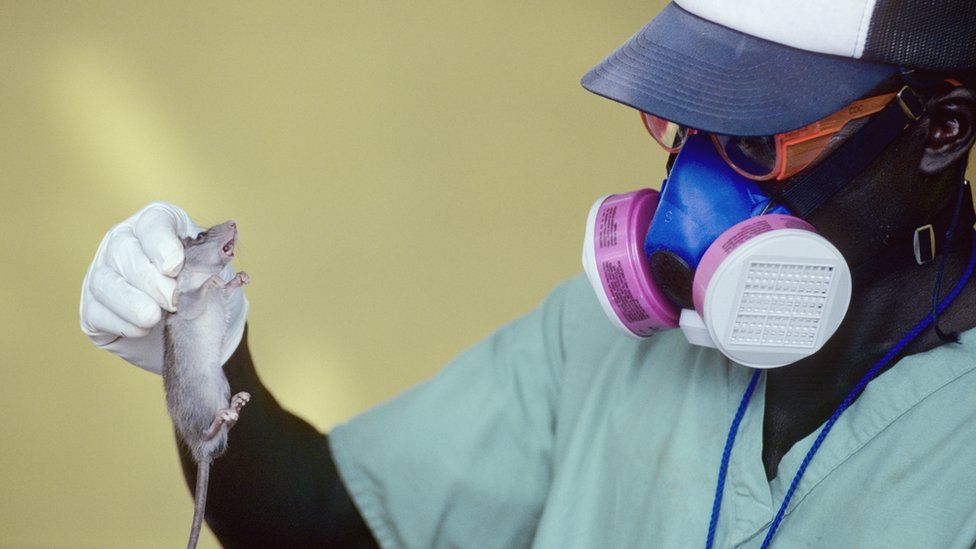lassa virus uk
Lassa viruses are enveloped single-stranded bisegmented ambisense RNA viruses. A total of two people have so far been confirmed to have the Ebola-like lassa fever virus in the UK according to the UK Health Security Agency UKHSA.

Lassa Fever Two Confirmed Cases Of Acute Virus In East Of England Bbc News
Lassa Ebola Marburg and Crimean-Congo viruses can spread from person to person through close contact with symptomatic patients or contaminated body fluids.

. Two cases of Lassa Fever have been detected in England after recently returning from West Africa. It is the first time. 2 days agoThe UK has only seen eight cases of this disease since 1980 but the UKHSA has described the risk to the UK public as very low.
The Lassa virus is transmitted to humans via contact with food or household items contaminated with rodent urine or faeces. Lassa Fever is an acute viral haemorrhagic. 1 day agoWed 9 Feb 2022 1300 EST Two people in England have been diagnosed with Lassa fever and a third probable case is under investigation the UK Health Security Agency has said.
A further probable case is currently being investigated. The disease was first described in the 1950s and the virus was identified in 1969 after 2. Those infected are members of a family that recently returned from west Africa where the disease is endemic according to the UK Health Security Agency UKHSA.
4 hours agoRare viral haemorrhagic disease similar to Ebola surface in the East of England Two people in the UK have been diagnosed with Lassa fever a rare viral haemorrhagic disease similar to Ebola. 1 day agoTwo people in the UK have been diagnosed with Lassa fever - an Ebola-like virus that can cause symptoms like vaginal bleeding and deafness. Their genome is contained in two RNA segments that code for two proteins each one in each sense for a total of four viral proteins.
CASES of Lassa Fever have been found in the UK after a family travelled to West Africa. The cases are within the same family and are linked to recent travel. 1 day agoLONDON -- Cases of Lassa fever have been identified in the United Kingdom for the first time in over a decade.
87 Three British nationals have been brought back to the UK from Sierra Leone for medical assessment after coming into close contact with two people diagnosed with Lassa fever. What is Lassa Fever. Access Lassa Virus case definitions.
The patients are within the same family in the East of England the UK Health Security said WHAT IS. 1 hour ago1547 11 Feb 2022 The first person in the UK has died of rare rat-borne virus Lassa fever in UK with two other cases being investigated. Lassa fever also known as Lassa hemorrhagic fever LHF is a type of viral hemorrhagic fever caused by the Lassa virus.
Two people from the East of England caught the disease with a third person being monitored by health chiefs. When symptoms occur they typically include fever weakness headaches vomiting and muscle pains. Health Security Agency UKHSA confirmed in a press release Wednesday that two people have been diagnosed with Lassa fever in England while a third probable case is under investigation.
Symptoms The incubation period varies. One of the two Dutch. Lassa fever is an acute viral haemorrhagic illness of 2-21 days duration that occurs in West Africa.
2 days agoWe can confirm that 2 cases of Lassa fever have been identified in England and a further probable case is under investigation. Lassa fever is an animal-borne or zoonotic acute viral illness. Neighboring countries are also at risk as the animal vector for Lassa virus the multimammate rat Mastomys natalensis is distributed throughout the region.
The rat-born virus is potentially lethal. Uniform criteria used to define a disease for public health surveillance. Lassa fever is an acute viral haemorrhagic illness caused by Lassa virus.
1 day agoLassa fever is an acute viral haemorrhagic illness caused by the Lassa virus which can be serious and in some cases fatal. Imported cases in the UK Print this page Lassa virus is a member of the arenavirus family. It is endemic in parts of West Africa including Sierra Leone Liberia Guinea and Nigeria.
Many of those infected by the virus do not develop symptoms. They live in the East of England. The large segment encodes a small zinc finger protein Z that regulates transcription and replication and the RNA polymerase L.
Prior to these cases there have been eight cases of Lassa fever imported to the UK since 1980 with the last two cases occurring in 2009.








